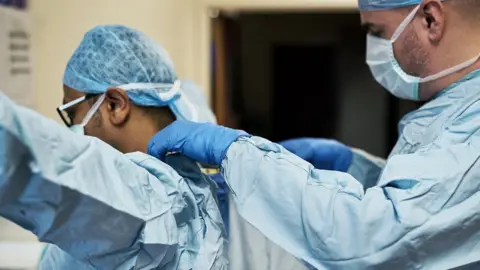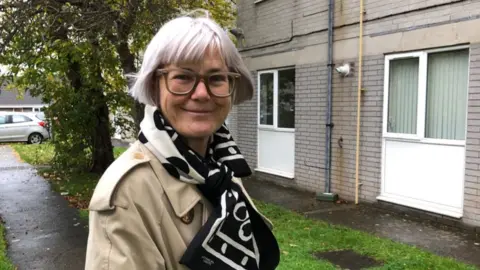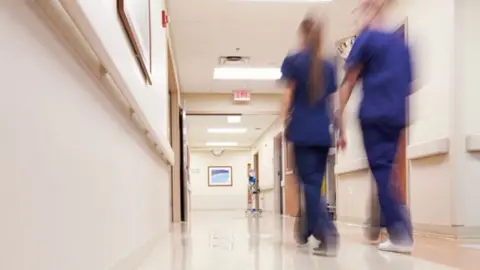Covid: Doctors want review of how patients are discharged
 Getty Images
Getty ImagesSenior doctors have called for a review of how hospital patients in Wales are discharged during the pandemic.
The Royal College of Physicians said guidelines were causing delays and adding to pressures faced by the NHS.
It said patients who had recovered were staying longer than needed, taking up beds.
The Welsh Government said its guidelines allowed both Covid and non-Covid patients to be discharged as promptly and safely as possible.
Data on how hospitals are faring during the pandemic is set to be published on Thursday morning.
It comes as the body that represents surgeons has called for a return to publishing figures on how long people are waiting for operations, raising concerns that patients are deteriorating due to a "patchy and inconsistent" recovery plan.
'Unintended consequences'
Guidance for discharging patients during the pandemic was published in April and updated in July.
Under some circumstances, it says patients must be in a position to self-isolate for 14 days after they have left and if this is not possible they should be transferred to a "suitable step down facility".

But Olwen Williams, vice president of the Royal College of Physicians in Wales said this was leading to "bottlenecks" in hospitals.
"One the challenges we're seeing at the moment is that actually there is a delay in getting people back out to their normal area of residence because of guidelines being put in around the time that they have to stay in hospital free of symptoms of Covid, and with negative tests, and as a result this is causing an increased occupancy of hospital beds.
"Then as a result, we are unable to admit new patients who are also requiring care."
She said it was "particularly concerning" that people requiring discharge were "now fit and well and are actually running a risk by being in hospital for longer than one would anticipate".
She added: "I think there are unintended consequences of trying to protect at one end and actually inadvertently doing harm at the other."
 Getty Images
Getty ImagesDr Williams acknowledged there had been some reluctance in moving patients out into the community.
More than 1,000 patients were discharged into care homes without Covid tests at the start of the pandemic.
There have been a total of 714 Covid-19 deaths in care homes up to 16 October, making up 26.5% of all coronavirus deaths in Wales.
Dr Williams says clinicians have been left to make face tough decisions and a more consistent approach is needed.
"We do recognise that harm was done earlier on in the year... but now really it's about getting that balance of risk between ensuring people don't acquire Covid and ensuring people without Covid get the timely care that they need."
Meanwhile the Royal College of Surgeons said it was struggling to work out where pressures in the system were coming from because of a lack of data.
'Patchy and inconsistent'
All planned surgeries were put on hold March and it said the Welsh Government had not published referral to treatment times for surgery since then.
Richard Johnson, director in Wales for the Royal College of Surgeons and a consultant breast surgeon, said: "The recovery of surgical services in Wales has been patchy and inconsistent after the Covid stoppage.
"The now resurging incidence of coronavirus along with winter pressures is putting this fragile recovery of planned surgery in Wales at risk."
He added: "At the centre of all this are patients who really need their operation. Many are in serious pain, with their conditions deteriorating while they wait.
"We are urging Welsh Government to publish referral to treatment waiting times in Wales."
He said the information would help them "understand where the pressure points are in the system so we can plan accordingly".
Welsh Conservative health spokesman Andrew RT Davies said: "This is a serious problem that needs addressing immediately by the Welsh Labour Government."
He called for an "urgent review" of how hospital patients are discharged.
The Welsh Government said: "The challenge of managing patients in hospital with and without Covid is unprecedented.
"The hospital discharge guidance, updated on 2 July, enables discharge to the community as promptly and safely as possible."
It added: "We have been clear that all urgent activity, including cancer work, should continue where it was safe and in the patient's best interest.
"Health boards are doing all they can to keep Covid and non-Covid patients separate and have been changing the care environment with the creation of 'green zones'."
